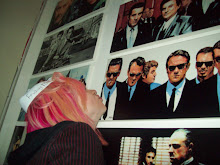 Urgh, even Mrs Mallory's face is mega-irritating....
Urgh, even Mrs Mallory's face is mega-irritating....OK, I hate to jump aboard the cliche train, but I have to agree with the rest of the class. I. Did Not. Hate. Stagecoachh. Aaahhhh. It took alot for me to say that, believe me. I dunno why I have such an aversion to the genre. The only 'Western' that I'll admit to really loving is The Proposition, and I didn't realise it was a Western I was going to see. I knew it was written by Nick Cave, that was enough for me.
But yeah, after much debacle over trying to arrange screenings and share the DVD, I decided just to watch Stagecoach on Youtube. Which meant having to watch it in a series of ten-minute videos. I didn't actually find it too irritating after a while; in fact each scene ended on a 'hook' which did actually make me want to find out what was coming. I appreciated it from a writer's point of view, especially after the classed with Richard...we've been having it drummed into us all year, whether it be film or television writing, that you have to have a hook to keep your audience intrigued. Otherwise, what's the point? What reason is there to keep watching, if there's nothing making you want to?
In this sense, Stagecoach was very much a character-driven screenplay, and the characters, although obviously contrived to be clashing archetypes, all complement each other well. They were all from different social classes, and were fairly typical of Western stereotypes- the alcoholic doctor, the respectable soldier's wife, the prostitute, the crooked banker, John Wayne... The difference was, it wasn't just white people in white hats shooting 'savages' in headdresses. Essentially it's a 'road movie', probably among one of the first. I love road movies, like Easy Riders, Fear & Loathing and Thelma & Louise, which is probably why I didn't mind Stagecoach too much. I really don't like Westerns because mostly, they seem to show white people taking over an area, chasing out the natives and calling them 'savages' and taking every opportunity to have a shoot-out.. it's very 'masculine', and smacks a little of big boys and their toys. Yaaawwwnn... I remember my grandad being a big fan of the old classics like She Wore A Yellow Ribbon, and them ALWAYS being on, so maybe I just inadvertently OD'd on them when I was a kid.
I liked how the majority of the film is about the intereaction of the characters, particularly the burgeoning romance between prostitute Dallas and The Ringo Kid (played by, surprise surprise, The Duke). He falls for her from the beginning, referring to her as a 'lady' when the others in the coach won't even offer her a drink of water. I liked how the other male characters began to gravitate towards her and treat her as a human being. One character I never warmed towards was Mrs Mallory, who barely even acknowledged all Dallas's attempts to help her when she went into labour. She was a really boring, bland character and not even that nice in doing so.
_01.jpg) Of course, there's the obligatory chase sequence between the Geronimo and the coach, but even this is filmed largerly from the perspective of the characters in the stage coach, rather than say, the cavalry. It's an impressively shot sequence; I appreciated it more after reading online about the difficulties involved with sound recording in Westerns. They hadn't made the transition from silent to sound particularly well, and John Ford was told he'd be committing career suicide. It's testament to the willingness and vision of early film makers, which I don't think there's enough of now.
Of course, there's the obligatory chase sequence between the Geronimo and the coach, but even this is filmed largerly from the perspective of the characters in the stage coach, rather than say, the cavalry. It's an impressively shot sequence; I appreciated it more after reading online about the difficulties involved with sound recording in Westerns. They hadn't made the transition from silent to sound particularly well, and John Ford was told he'd be committing career suicide. It's testament to the willingness and vision of early film makers, which I don't think there's enough of now.Since we see and learn so much about the characters, it heightens the tension in the chase sequence, and adds to the excitement of 'who'll live or die'. I found myself actually wanting to see whether the coach would make its destination, and what would happen to the characters when they got there. Would Dallas and Ringo ride off into the sunset, or would he be taken back to jail? Is Mrs Mallory's husband alive? While they may not all be particularly sympathetic or likeable, they are un doubtedly involving. I can quite honestly say, had we not been asked to blog about this film, I'd never have watched it. I doubt there's many more films of the genre which would involve me in the same way and spend so much time on character exposition, but it was a good example of early film making that worked when really, it shouldn't have. Its year of release was 1939, considered by many to be the greatest year in cinema history (whatever, I still say it's 1994), so it's undoubtedly impressive that it managed to stand out even among such competition.


No comments:
Post a Comment